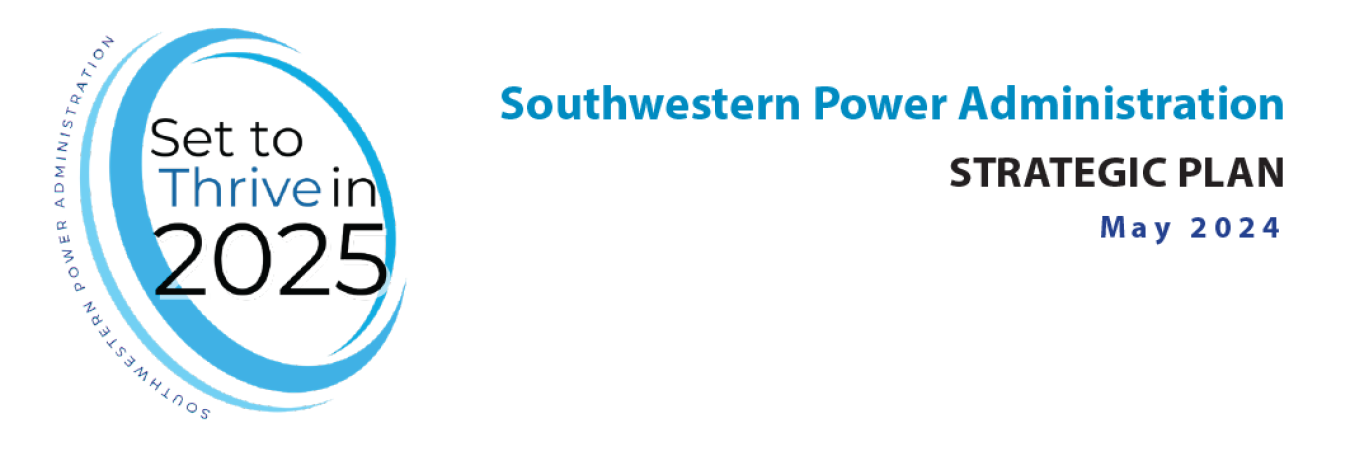
Administrator’s Message –
Set to Thrive in 2025
It has been said, “The most powerful organizations adapt and self-correct in order to thrive.”
That statement embodies the essence of what Southwestern has undertaken in our most recent strategic planning revision, “Set to Thrive in 2025.”
In our latest revisions to the plan, we have taken lessons learned from an electric industry that is ever evolving, a workforce that strives for flexibility and transparency in the workplace, and a culture that has been completely changed forever by the pandemic to look for opportunities for improvement, all the while maintaining our foundational mission, vision, core values, and leadership philosophy.
We have focused in on implementing tactical action plans that improve feedback loops from employees; embrace industry change and opportunities while managing risk; explore better ways to manage projects; strengthen internal and external partnerships; look for opportunities to expand revenue streams; and collaborate with customers on new innovations.
As we embrace and implement these efforts, I have every confidence that Southwestern will indeed Thrive in 2025!
Sincerely,
Mike Wech
Administrator
Optimally use Federal resources to safely and sustainably provide clean hydropower, transmission, and related services to benefit our customers, regional communities, and the Nation.
Interconnecting our partners with the future of electricity.
Safety – Protect yourself and others, both physically and psychologically.
Integrity – Do what is right morally, ethically, and honestly, even when it is difficult.
Courtesy – Treat people with dignity, respect, and kindness.
Collaboration – Work together to achieve greatness.
Commitment – Dedicate yourself to the success of Southwestern and all employees.
Courage – Engage, embrace, and address change and challenges.
Workforce Excellence – Strive to be fully staffed, with a team of highly-qualified, engaged professionals who are excited to work for Southwestern.
Operational Excellence – Execute efficiently, invest strategically, and improve continuously to control costs and increase value.
Collaborative Partnerships – Develop and sustain successful, long-term, internal, and external strategic relationships.
Evolving Services – Develop and provide services within an evolving energy landscape.
Support Southwestern’s vision, mission, core values, and strategic plan through behavior and communication.
Demonstrate patience, actively and respectfully listen, and work to understand what is being communicated before responding.
Encourage, enable, and empower employees.
Champion the investment of time and resources for training, development, and team building.
Share information and be transparent.
Look beyond day to day business and voice thoughts and concerns that continually move Southwestern toward excellence.
The Flood Control Act of 1944 (58 Stat. 887, 890; 16 U.S.C.A. 825s) is Southwestern’s main authorizing legislation.
Through Section 5 of this Act and a series of Executive Orders and Departmental Orders, Southwestern’s Administrator is authorized to “transmit and dispose of… power and energy in such manner as to encourage the most widespread use thereof at the lowest possible rates to consumers consistent with sound business principles.”
Southwestern is also authorized to draw up rate schedules for such power and energy, with the goal of recovering, with interest, the investment of the American people.
By law, Southwestern’s power is marketed and delivered to not-for-profit municipal utilities and rural electric cooperatives. Southwestern has over one hundred such “preference” customers, and these entities ultimately serve over ten million end-use customers.
Our Customers
The Department of Energy
The U.S. Army Corps of Engineers
Federal and contract employees
Congress and the American public
The utility industry
Water resource interest groups
The Office of Management and Budget
Other Federal and State agencies

